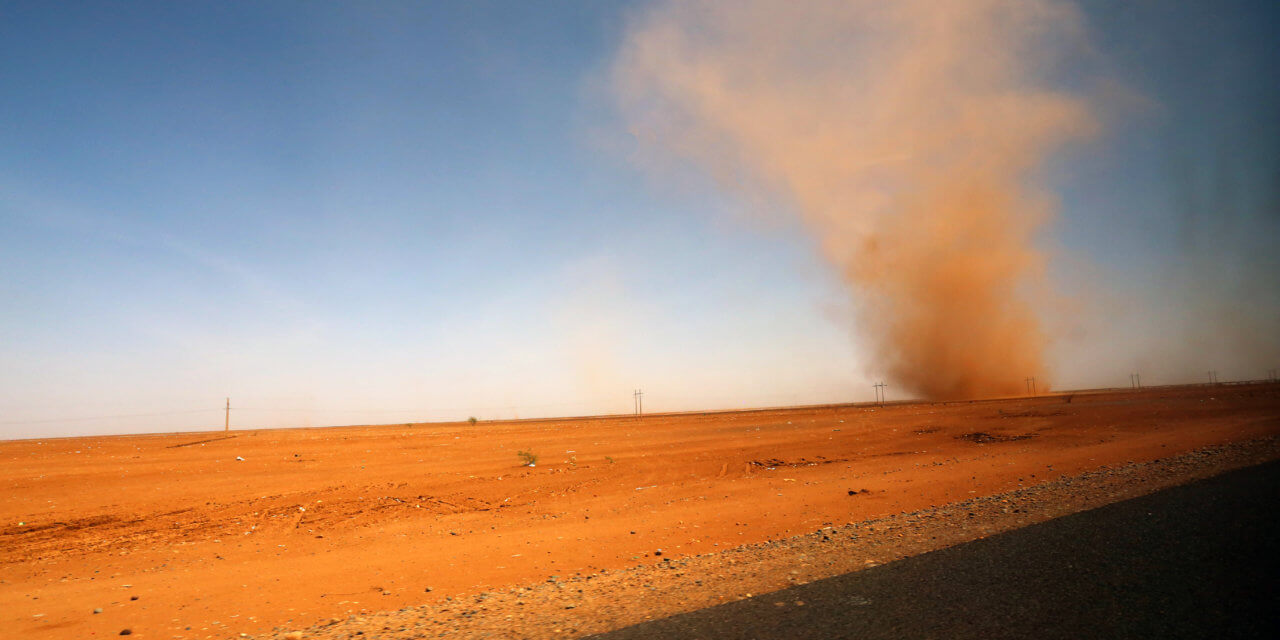A symptom of climate change: Sudan witnesses more dust devils. (cc) IAEA | Nicole Jawerth | April 6, 2016
When there is something wrong in the forest, there is something wrong in society. In Kassala, the total area of forests is only eight percent of the total area of the state. AlAdwaa.Online’s Hamid Ibrahim investigates what went wrong.
Not too long ago, singers sang songs and poets wrote poems praising the natural beauty of the different regions in Sudan. Today, much of Sudan is suffering from desertification and dust. Forests, in particular, have undergone a dramatic degradation during the former regime’s era, similar to all other aspects of life in Sudan.
Sixty-five percent of Sudan’s population lives in rural areas, and more than 60 percent of their energy comes from burning wood. The last five decades of rapid population growth, over 43 million people today, has put more pressure on natural forests and increased the demands for timber, increased land grabbing and grazing and led to deforestation and land degradation.
Besides the population pressure, says Engineer Manal Ali Abdelhalim, head of the Sudanese Society for Environmental Protection in Kassala, the reasons for the deforestation in the past can be summarised in one word: corruption.
“Ugliness increased as a result of corruption and nepotism.”
Manal Ali Abdelhalim
“As a result of rampant corruption during the former regime’s era, many beautiful things have decreased while many ugly things have piled up. The area of ugliness increased as a result of corruption and nepotism drying up the country,” says Abdelhalim. “Even peoples’ hearts have become alienated and estranged, not to mention forests.”
Explaining the many reasons behind the deterioration of the environment in Kassala, she said that “all this happened for many reasons, including the absurd wars ignited by the former regime, which have led to displacement and environmental destruction.”
In addition, the leadership of the regime gave thousands of hectares of tree-covered areas to members of the ruling party within the ‘Tamkeen’ framework, a biased and nepotistic empowerment policy, favouring those loyal to the regime.
Isam Abdelkarim is the director of the Forests National Corporation (FNC) in Kassala State. He says that “the area of forests is only eight percent, a very low percentage even compared to other Sudanese states”. The goal set by the FNC is to reach 20 percent of forrest area in each state, explains Abdelkarim. “In comparison, the green areas in Khartoum State constitute between 30 and 40 percent.”
Kassala State’s eight percent figure is lower than the 11 percent of total tree cover of the total land area in Sudan, according to the FAO 2015 data.
“Preserving environmental balance, reforestation, spreading environmental awareness and increasing tree cover areas are among the aims of the FNC,” adds Abdelkarim.
For social peace
Natural resources such as pastures, forests and water play an important role in social peace. A decrease in grazing areas leads to conflicts between pastoralists and farmers.
Climate change and the lack of water sources are also leading to conflicts. For example, one of the root causes of the Darfur conflict is creeping desert conditions that have led to conflicts between farmers and herdsmen.
One of the main challenges facing the FNC, according to its director in Kassala, is the unregulated expansion of agriculture at the expense of forest areas, as well as the limited resources available for forests.
“Our main partners are the Sudanese people, who with their awareness and patriotism, can contribute to the reconstruction of their homeland and at the forefront of it are forests,” says Abdelkarim.
“Our main partners are the Sudanese people.”
Isam Abdelkarim
To achieve the 20 percent target forest coverage in Kassala, the FNC is counting on Sudan’s youth. “Our hope is that the new era, with the success of the glorious December Revolution, will see the achievement of this goal. We constantly coordinate with the resistance committees’ youth in Kassala State to work on a major programme for the promotion of forests, which will be part of the Hanabniho Youth Initiative campaign (We will Build it),” says Abdelkarim.
As part of Sudan’s celebrations marking the first anniversary of the December Revolution, the government announced a campaign to plant one million trees in 2020, inaugurated by Prime Minister Abdallah Hamdok.
These ambitious plans depend on the FNC’s routine activities. “We, in Kassala State, have six nurseries that produce more than one million seedlings a year, and we also collect between 10-15 tons of seeds every year to sow them in targeted areas,” explains Abdelkarim.
Environment: a global issue
Since concern for the environment is not only a national matter in Sudan, cooperation between the various countries is necessary.
For example, cutting a large number of trees near the Nile has severe consequences for the river’s flow and, therefore, on floods, which has implications for Nile Basin downstream countries.
This is one of the reasons why several international organisations have supported Sudan’s conservation activities.
Engineer Tanahi Hassan Hussein, Secretary-General of the Sudanese Environment Conservation Society (SECS), told Aladwaa.Online about the partnership with Coopi, an Italian NGO which works on environmental conservation. “We work in eight villages in the Aroma and the North Delta rural localities, and we have conducted awareness forums in Matateeb, Oleeb, Amaray, Koja and Om Jaddad.”
These forums take different forms, such as seminars, awareness-raising plays, and lectures in the local Beja language, with focus on various topics such as water, pollution, the dangers of domestic mining and plastic products and their impact on environmental degradation.
About the FNC
The Forests National Corporation (FNC) was established in 1902, i.e. more than a century ago under the joint Anglo-Egyptian Condominium and was administered by the United Kingdom until it was nationalised in the 1950s.
The FNC operated under various laws and legislations throughout its existence, due to the general political changes in the country, i.e. civilian or military rules.
The legal status of FNC continued to fluctuate, with it being part of the Ministry of Agriculture and Forestry at one time or acting directly under the presidential offices.
What remained stable was the federal character of the FNC: it reports directly to the centre in Khartoum, although it coordinates with state governments. It now is mandated under the FNC Act of 2002, which is a federal law.

